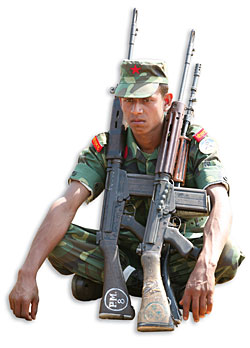 |
The gushing travelogue Arundhati Roy wrote about her experience of being embedded with the Naxalites appears to have created a spot of bother for the celebrated activist and author. The Director General of Police is contemplating action against her under the draconian Chattisgarh Special Public Security Act. The anger against the Maoists is so strong among the comfortable classes that the voice of a few civil society activists may not be enough to prevent her arrest.
The middle class is on the warpath against what Premier Manmohan Singh has repeatedly characterised as the greatest security threat to the Indian republic. The business community is baying for the blood of the Maoists. Militant Hindu groups have always detested leftwing movements. Now an influential section of the Indian media has joined the chorus and is openly calling Roy's 'Gandhians with guns' terrorists.
Roy did get somewhat carried away with her 'thousand-star lodging' in the jungles of Chhatisgarh. Gandhians and guns are contradictions in terms. The Mahatma was quite emphatic in stating: "I can find a thousand causes to die for, but I have never found a single cause that I can kill for." The massacre of hapless security personnel by stealth at Dantewada shows that the group behind the atrocious crime deserves no public sympathy. The grievances of the poor in the tribal belt are real, but such a response is abhorrent.
Maoists may justify the butchery as a 'propaganda of the deed' or even the 'violence of defensive offence'. Acolytes of the Great Helmsman are masters in the art of obfuscation. But the massacre of 76 CRPF jawans at Dantewada was an act of terrorism pure and simple. Of course, occasional acts of terror don't make an entire group terrorists. If that were so, the security forces that make people 'disappear' would deserve the tag, too. In civilised societies, crime needs to be condemned but the criminals have to be saved, sometimes from their own stupidity, insanity and rage.
Politicians have to resort to fiery rhetoric. In the wake of 9/11, George Bush II bluffed about 'smoking out' al-Qaeda from its mountain hideouts. Similarly, Indian Home Minister P. Chidambaram can be forgiven for exclaiming that he will "wipe out the Maoists in two to three years". The media has to see through the bluster.
When the Maoist insurgency began in Nepal, the media here was still on a learning curve. Leftwing romanticism enticed some influential reporters into depicting armed guerrillas as saviours of the poor and the downtrodden. A few rightwing editors allowed themselves to become apologists of the insurgents to vent their anger against the government of Girija Prasad Koirala. But by and large, the Nepali media avoided the 'us against them' oversimplification, even though the conflict here has been far more ruthless and has consumed many more lives than the 40-year-old Naxalite insurgency.
Enough Nepali journalists have been to India to see how the free press functions in the supposedly largest democracy of the world. Perhaps now it's time to invite some Indian mediapersons to Kathmandu to show them methods of coping with the asymmetrical warfare of misinformation. The Nazi propaganda minister Joseph Goebbels once said, "Think of the press as a great keyboard on which the government can play." The Indian media needs to contemplate the consequences of accepting such a role. Not that we need to gloat, but we have been better learners and need to revisit our own experiences to face the challenges of an uncertain future better.
READ ALSO:
They're here, by Prashant Jha - From issue #500 (30 April - 6 May 2010)



